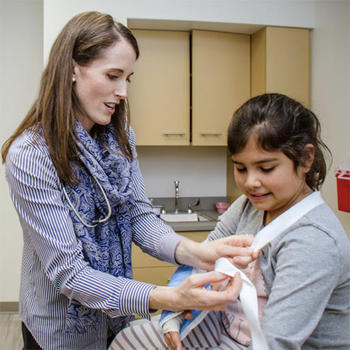 An advanced practice registered nurse (APRN) is a nurse that holds a minimum of a Master’s degree in addition to their initial nursing education and must meet license criteria for all registered nurses within their respective state.
An advanced practice registered nurse (APRN) is a nurse that holds a minimum of a Master’s degree in addition to their initial nursing education and must meet license criteria for all registered nurses within their respective state.
APRNs treat, diagnose illnesses, advise individuals and the public on health issues, manage chronic diseases, and collaborate with other health professionals to provide optimal health outcomes for individuals and communities. They stay current through continuing education in technology, evidence-based care, and methodologies throughout their career.
Within the role of the APRN, there are several specialty roles:
-
Certified nurse midwives: providing primary, gynecological and reproductive health care to women
-
Clinical nurse specialists: provide expertise and support to nurses who are caring for patients, help to drive practice changes throughout organizations, and ensure use of best practices within organizations to optimize patient outcomes
-
Certified registered nurse anesthetists: provide a full range of anesthesia and pain-management services
-
Nurse practitioners: provide primary, acute, and specialty health care across the life span. Including but not limited to assessment, diagnosis, and treatment of illnesses and injuries. Within the NP role there are subspecialties:
-
Family Nurse Practitioner (FNP)
-
Women’s Health Nurse Practitioner
-
Acute Care and Gerontology Nurse Practitioner
-
Emergency Nurse Practitioner
-
Psychiatric Nurse Practitioner
-
FNP (independent license, collaborative or full scope of practice depending on state)
-
Educates individuals and communities on health promotion and disease prevention
-
Takes medical histories and performing physical exams
-
Diagnoses and treats episodic complaints as well as chronic conditions in patients
-
Orders and interprets diagnostic tests
-
Incorporates a holistic approach to managing and treating the health and well-being of individuals across the life span
-
Orders consults such as OT, PT, SW, SLP, HHC
-
Prescribes medications when needed to treat conditions
-
Performs procedures within scope of practice
-
Collaborates with specialists to manage complex chronically ill individuals
-
Functions as a primary care provider within patient-centered medical homes
Additional Resources
Advanced Practice Registered Nurses Family Nurse Practitioner
